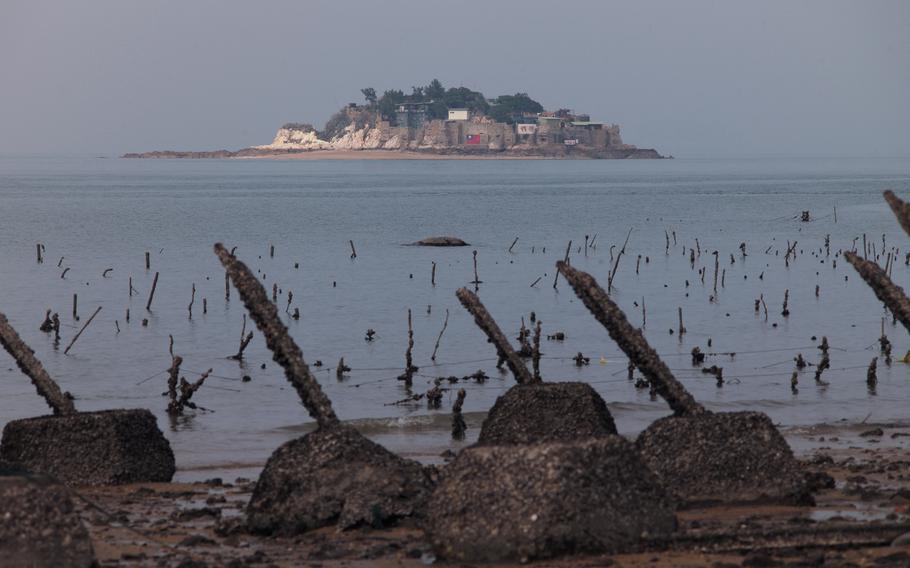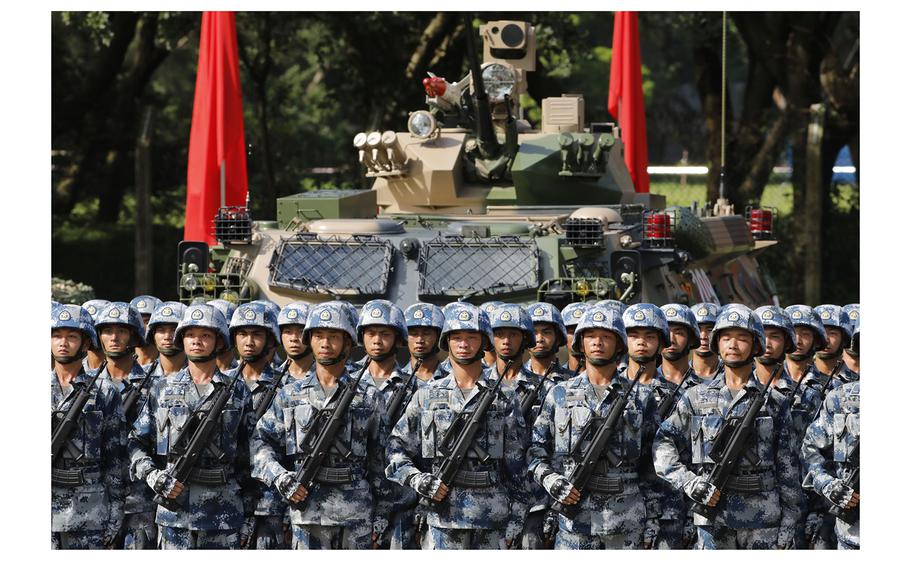Asia-Pacific
Taiwan is readying citizens for a Chinese invasion. It’s not going well.
The Washington Post August 4, 2024

This picture taken on December 5, 2023 shows Taiwan’s remote Shihyu islet. (Sam Yeh/AFP/Getty Images)
TAIPEI, Taiwan — In the imagined blockade of “Zero Day,” a Taiwanese television drama that will be released next year but is already causing a stir, the Chinese military has encircled Taiwan, cutting it off from the world and plunging the island democracy of 23 million into crisis.
In a 17-minute trailer released last week, the public responds to China’s blockade with a mixture of terror and resignation. Young couples ride bikes past tank convoys on empty streets. Criminal gangs stir up chaos on behalf of Beijing and its territorial claims over Taiwan.
Taiwanese shouldn’t fight and couldn’t win anyway, an influencer tells her followers in the series. “Those who want us to enter the battlefield — they really don’t care about our suffering,” she says.
It may be fiction, but the show’s bleak assessment of Taiwanese readiness to fight touches upon a very real problem facing President Lai Ching-te, who took office in May and whom Beijing considers a dangerous separatist.
The threat from Beijing has intensified as Chinese leader Xi Jinping has declared China’s “reunification” with Taiwan inevitable. He has underscored his willingness to use force to achieve that goal by sending rising numbers of warplanes and navy ships to probe the island’s defenses.
Taiwan’s government has been trying to improve its defenses by extending mandatory military service and revamping ongoing training for reservists as part of a broader shift in defense strategy designed to make Xi think twice before taking a gamble on use of force.
But young Taiwanese are not answering the call, and Defense Minister Wellington Koo recently acknowledged a lack of equipment and instructors has slowed attempts to professionalize reservist training.
“I must honestly say that we need to quickly strengthen [training] as there is still a lot of room for improvement,” he told the legislature in June.
Such admissions may concern Donald Trump, who has signaled a more transactional approach to American support for Taiwanese defense if he is reelected president in November.
Taipei wants to create a professional backup force to support 155,000 active-duty soldiers. All Taiwanese men born in or after 2005 are now required to enlist for a year of service, while some 2 million former soldiers are supposed to complete refresher training every two years.
But officials have acknowledged being behind schedule with plans to teach reservists and draftees how to supplement front-line troops in the event of a war. Only 6 percent of eligible conscripts — 6,936 people — took part in the newly implemented 12-month program this year. Most deferred military service to first attend university, meaning the 2005-born intake cohort won’t be fully trained until 2027.
Those doing military service this year are not undergoing the anticipated training. A select group of one-year conscripts were supposed to be learning to use drones, Kestrel antitank rockets and surface-to-air Stinger missiles but there were not enough trainees this year to begin the training, according to a Defense Ministry officer.
Taiwan’s slow progress on boosting training concerns military experts in both Washington and Taipei, who are urging authorities to move faster to deter Xi and prevent a war.
“The last thing that Taiwan wants is for Xi Jinping, as the key decision-maker in China, and for the United States, as the key ally of Taiwan, to doubt Taiwan’s commitments to its own defense,” said Matt Pottinger, who was U.S. deputy national security adviser in the Trump administration and is now a visiting fellow at the Hoover Institution.
To do that, Pottinger said, Taiwan needs the political will and foresight to dedicate some of its best military officers to recruitment and instruction. “I’m really hoping that Taiwan makes these sacrifices,” he said.

People's Liberation Army troops stand in formation during a ceremony at the Shek Kong Barracks in Hong Kong on June 30, 2017. (Anthony Kwan/Bloomberg)
China’s military, the largest standing army in the world, has 2 million active personnel and recruits about 400,000 conscripts every year. Its defense budget of $230 billion was 13 times as large as Taiwan’s in 2023 and its military regularly trains to take the island in a sudden overwhelming assault.
The United States is required by law to help Taiwan strengthen its own defenses, including through arms sales, but it isn’t formally committed to intervening against a Chinese attack, a policy known as “strategic ambiguity.”
While President Biden has repeatedly said he would send the U.S. military to defend Taiwan, Trump has made no such promises. Asked what he would do in an interview last month, Trump said that Taiwan was “9,500 miles away” and should pay for American defense.
Taiwan must be “mentally prepared” for a Trump victory in November — and the scrutiny that will come with that, said Mei Fu-hsing, director of the Taiwan Security Analysis Center, a New York-based research center.
“If [Trump] is reelected, he will certainly demand Taiwan to significantly increase its own defense spending and be more proactive in preparing for war,” Mei said.
Improved training is a key way for Taiwan to show it is taking military readiness seriously, analysts say. But new programs have continued to face shortages of funding, instructors and equipment, leading to regular complaints from attendees about the quality of instruction, according to reservists as well as official statements acknowledging setbacks.
“It was a complete waste of time,” said Vincent Tsao, a 30-year-old scuba diving instructor who spent most of his five days of reservist training last week sitting idly inside being taught by retired soldiers who openly acknowledged they weren’t prepared to lead the program.
Taiwanese men who completed mandatory service within the last 12 years are theoretically called back for refresher training every second year, although in practice many attend far less frequently. Only a fifth of the reservists who went through refresher training last year completed the newly extended two-week course, with the majority doing only five or seven days.
Preparing 2 million reservists for “immediate combat readiness” as a second line of defense is “very important for defending Taiwan,” said Han Gang-ming, former director of Taiwan’s All-out Defense Mobilization Office, which oversees reservists.
“Since the reserve force is not the primary combat unit, we are always placed last whenever budgets are allocated,” Han said.
Fighting a ‘defeatist’ attitude
Since taking office in May, Lai has vowed to press ahead with his predecessor’s reforms that will improve readiness and warned the military to guard against a “defeatist” attitude, telling troops they cannot presume “the first battle will be the last battle” should China attack.
But the new administration has not yet announced major changes to training beyond scrapping ceremonial bayonet and goose-stepping drills.
Lai also faces fierce pushback from the Beijing-friendly Kuomintang, which controls the legislature, and has accused the ruling Democratic Progressive Party of trying to turn Taiwan into a “powder keg.”
China, which wants to undermine Lai, has claimed that he wants to turn ordinary people into “cannon fodder.”
But analysts say Taiwan must prepare for the new realities of an increasingly aggressive China.
Taiwan’s military strategy has long focused on stopping China before its troops crossed the 110-mile strait that separates them, but a growing number of defense analysts in Taipei and Washington say Taiwan must prepare for the worst possible scenario: a protracted battle on the island itself.
“Taiwan’s reservists are going to be mobilizing where the fight is happening, when the fight is happening,” said Michael Hunzeker, a retired Marine who studies military reform at George Mason University.
The island is patently not ready for that, according to people who have completed military training recently. Cony Hsieh, 31, who previously enlisted and served as a soldier for six years, signed up for reservist training as soon as women were allowed to join last year. She returned for a second round in May.
While there were minor improvements, the military was moving too slowly to gain public trust and make training more than a formality, she said. “I don’t even know what I’m supposed to do in my position if a war breaks out,” Hsieh, who is now working on a master’s degree, said in an interview.
Rising public concern about a conflict has left many in Taiwan asking themselves what they would do in a “Zero Day” scenario and how far they should allow China’s invasion threat to infringe on daily life.
Surveys show a majority of Taiwanese support the decision to lengthen mandatory service, but that doesn’t mean they think training is a good use of time or public funds.
“Everyone has their own lives and families. My wife would have to work and take care of the child by herself when I was away,” said Hsieh Yu-hsiang, a 30-year-old salesman at an insurance company who attended 14 days of training in early July.
Even so, he supports government plans to strengthen reservist training. “As the threat increases,” Hsieh said, “it’s inevitable that we need measures in place to respond.”
Abigail Hauslohner in Taipei, Taiwan, contributed to this report.